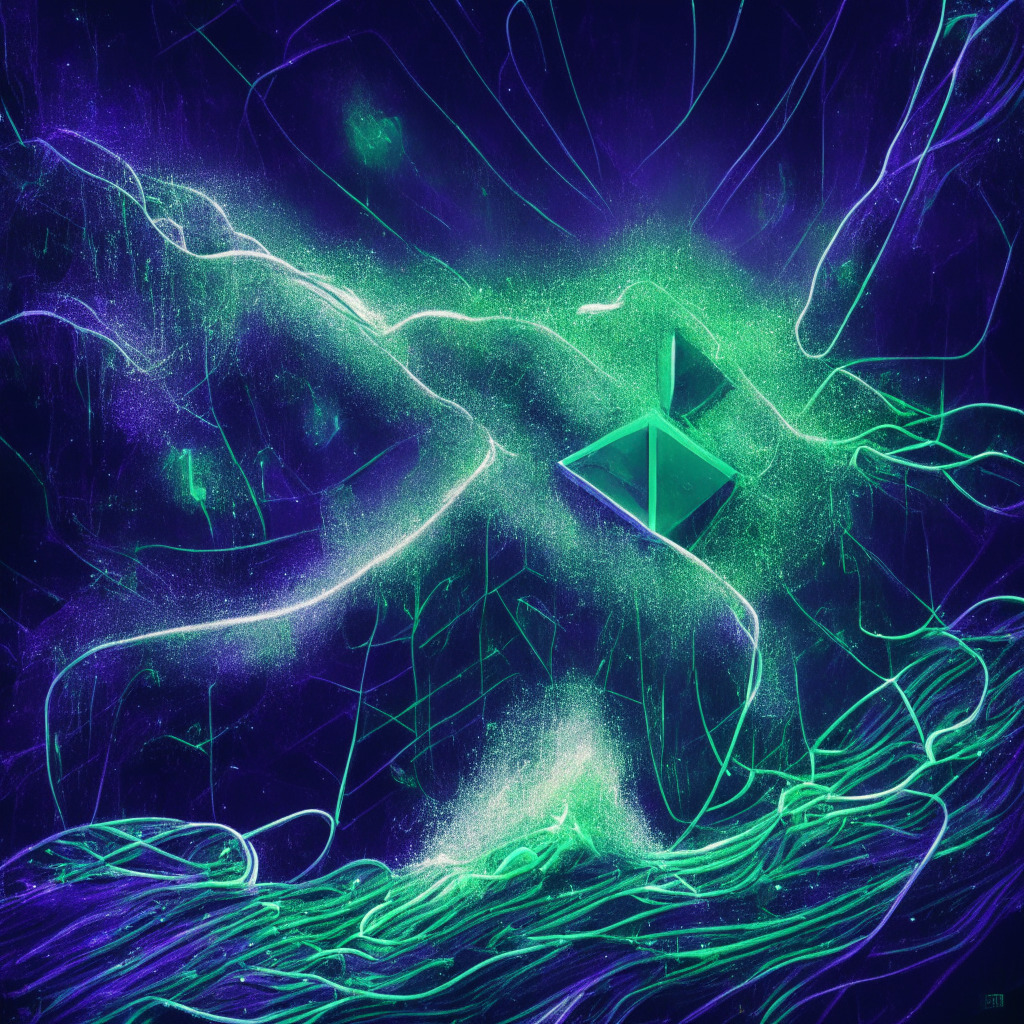Ethereum co-founder Vitalik Buterin’s proposed privacy pool concept focuses on combining blockchain privacy and regulatory compliance, sparking meaningful discussion in the crypto world. However, concerns over unclear compliance framework, implementation struggles, and acceptance issues remain to be addressed.
Search Results for: ZK proofs
Exploring the Edge of Ethereum Scaling: The Promising Potential and Challenges of Proto-danksharding and Linea
“Proto-danksharding, or EIP-4844, is a proposed Ethereum security feature set to significantly reduce fees for rollups. By introducing data blocks that are temporally attached and later erased, transaction costs are minimally affected. Despite promising advancements, rollup costs are largely dictated by data availability, challenging the thorough implementation of this crucial scaling solution in the Ethereum ecosystem.”
The Mounting Potential of Proto-Danksharding: A Game Changer for Ethereum’s Rollup Costs
The Ethereum ecosystem could see a significant change in rollup costs, a key aspect of its scaling solution, with the potential implementation of proto-danksharding. Nicolas Liochon, head of Consensys’ zkEVM Linea, anticipates this could decrease rollup costs tenfold. The technology, yet to be launched, could unleash untapped rollup potential.
Decentralized Exchange Brine Fi Secures $16.5M Amid Market Slump: A Game Changer or Mirage?
“Decentralized exchange Brine Fi has secured a $16.5 million investment led by Pantera Capital, despite the recent dip in venture capital for digital assets. Based on Ethereum scaling system StarkWare, Brine Fi offers a non-custodial, decentralized orderbook with privacy for trading positions. Pantera Capital praises its potential for mainstream and institutional adoption in DeFi.”
Unveiling Polygon’s Open Source Developer Stack: Scalability Promise vs. Skepticism
Polygon’s new open-source sidechain developer stack is set to power Layer 2 solutions on Ethereum, backing its commitment to the evolution of the Ethereum ecosystem. Key to this advancement is the integration of zero-knowledge proof technology, considered critical for the scaling of the Ethereum blockchain. However, critics raise concerns about potential inefficiencies and differing architecture.
PancakeSwap v3’s Expansion to Linea: A Revolution in DeFi or High-Risk Gamble?
PancakeSwap v3 recently launched an expansion to the Linea mainnet, aiming to attract a broader user base and boost revenue. The platform extends beyond Ethereum, into platforms including BNB Chain, and offers improved swap and liquidity provision functions. However, while promising, it’s crucial to understand the inherent risks involved.
Blockchain’s Revolution: A Stride into Financial Freedom or Predator Lurking in Grey Legalities?
“Blockchain technology and cryptocurrency are innovating financial systems; offering decentralization, resilience, and transparency as the new norm. However, challenges such as irreversible transactions, legal gray areas, and massive energy consumption are obstacles yet to be surmounted despite the promising prospects of the blockchain future.”
Unveiling a Tamper-Proof Future: The Revolution of Data Security in Blockchain with Zero-Knowledge Proof
“Space and Time, a decentralized Web3 data service, has launched a tool powered by Zero-knowledge proof technology for SQL queries. The company’s Proof of SQL ensures data integrity in its decentralized network, enhancing data security for retail, finance, gaming, and blockchain-based solutions.”
Revolutionizing Crypto Exchanges: Unveiling the Interplay of AI and Cryptocurrency
Gracy Chen, the managing director of Bitget, highlights the company’s integration of AI in various areas including translations, customer service, and an AI-powered chatbot for efficient data access and trading strategies. Bitget also explores zero-knowledge proof (ZK-proof) technology for improved data protection and user fund custody, indicating the transformative potential of combining AI and cryptocurrency.
Embracing AI in Crypto Exchanges: Advances and Challenges for BitGet
BitGet is using artificial intelligence (AI) to streamline operations and enhance user convenience in crypto exchanges. AI is instrumental in multi-language services, customer interactions and developing grid trading strategies. However, alongside AI advancements, user privacy and data protection remain crucial, with Zero-knowledge proof (ZK-proof) technology providing a solution for confidentiality and self-custody.
Scaling Ethereum’s Future: The Rise of Linea & the Road to Unlocked Potentials
“ConsenSys’ new layer-2 scaling solution, Linea, encourages developers to create or migrate decentralized applications for Ethereum. Powered by zero-knowledge proofs, Linea promises seamless Ethereum blockchain interaction, improved performance, better user experience, and lower transaction costs. Intertwined with MetaMask, it seeks to boost non-fungible tokens, blockchain games, and social media applications. Despite some initial access restrictions, Linea’s future looks promising.”
GPU Shortage as a Catalyst for Web3: How Decentralized Infrastructure Networks Benefit AI Startups
The GPU shortage could accelerate the adoption of Web3 by mainstream thanks to decentralized physical infrastructure networks (DePIN). Protocols like Akash, enabling GPU leasing to AI start-ups, and Arweave, offering permanent data storage, could help alleviate resource issues. DePIN could provide inexpensive, reliable infrastructure for startups, shielding them from AI threats and offering advantages over Web2.
Argus Labs Raises $10M: Revolutionizing Crypto Gaming with Scalable On-Chain Worlds
Crypto gaming startup Argus Labs raised $10m in seed funding for its World Engine, an SDK enabling game developers to create custom layer-2 blockchain networks on Ethereum. The platform aims to revolutionize gaming with increased on-chain elements, scalability, and user-generated content, empowering developers and players to build and expand Web3 games and communities.
Ethereum Superchain: The Optimism Bedrock Upgrade and Its Impact on Blockchain Landscape
Optimism’s Bedrock upgrade aims to improve Ethereum’s usability by reducing gas fees by 40% and deposit-confirmation times by 90%. This significant step towards a “Superchain” could revolutionize the blockchain landscape, providing a more secure and efficient platform for transactions, while facing intense competition from other layer 2 solutions like Arbitrum and ZK Rollups.
Billion-Dollar Token Bridge Thefts: Navigating Security in a Multi-Chain Era
2022 saw over $2 billion in token bridge thefts due to vulnerabilities in security measures. This article discusses common security breaches, including social engineering attacks, private key issues, and smart contract vulnerabilities, and highlights how experts are developing stronger security protocols for a secure multi-chain future.
Deutsche Telekom Embraces Blockchain by Supporting Polygon: Analyzing the Partnership
Deutsche Telekom enters blockchain sector by supporting Polygon infrastructure as a validator, aiming to boost security and decentralization. The partnership is expected to unlock ownership and autonomy, making Web3 technology more accessible and encouraging businesses to embrace blockchain via Polygon.
Ethereum Anonymity Boost: Andreessen Horowitz’s Cicada Library Unlocks Anonymous Voting Pros and Cons
Andreessen Horowitz’s venture capital fund has released Cicada, a Solidity library that significantly advances anonymous voting on the Ethereum platform by preventing individual voter choices from being disclosed before polling ends. Combining Cicada with zero-knowledge group membership systems enhances voter anonymity, while addressing challenges in encoding blockchain votes, paving the way for more democratic voting systems within decentralized autonomous organizations (DAOs).
Alchemy’s StarkNet Integration: A Turning Point for Blockchain Adoption and Innovation
Alchemy’s integration of StarkNet, the zero-knowledge (ZK) rollup scaling solution, signifies a potential turning point for mainstream blockchain adoption. The platform offers faster, cost-effective transactions and account abstraction for flexible crypto wallets, fueling developers’ interest in innovative blockchain applications. However, increased complexity and steep learning curves could present challenges.
Consensus 2023: Web3 Adoption, Corporate Interest, and the Need for Global Integration
Consensus 2023 showcased growing interest in Web3 technology adoption among large companies like Mastercard and Google Cloud. The event focused on essential Web3 strategies, innovations, and privacy, but could benefit from a stronger international presence to understand global opportunities.


















